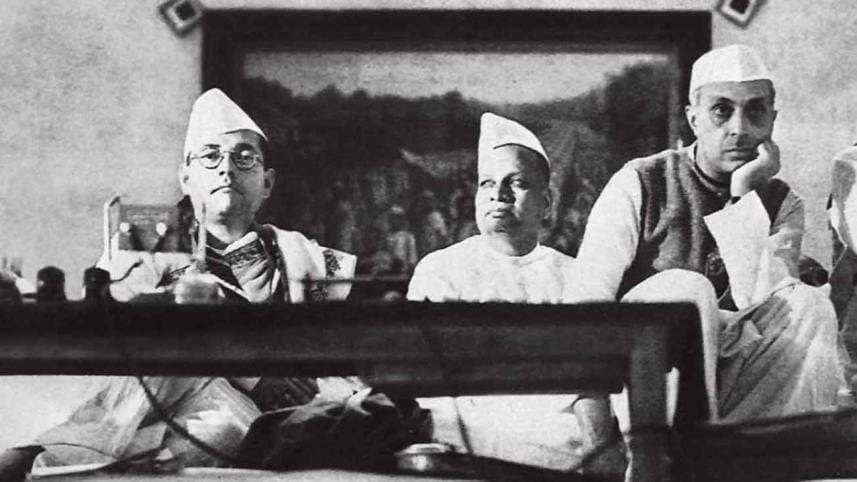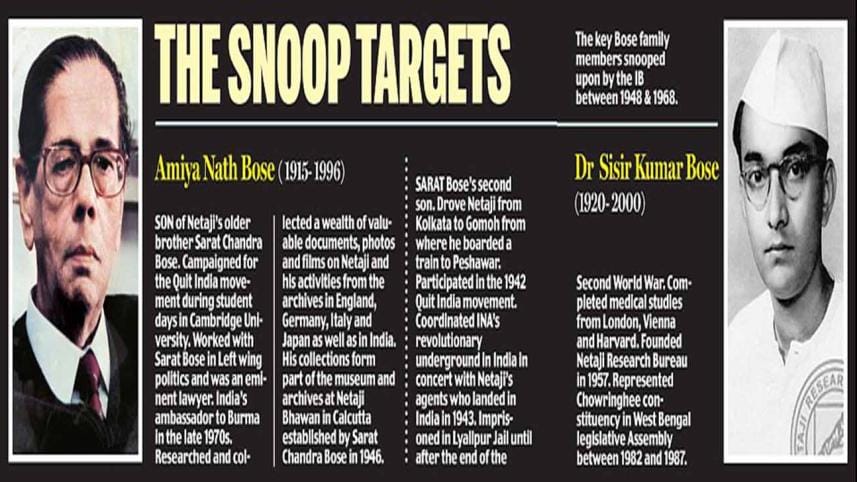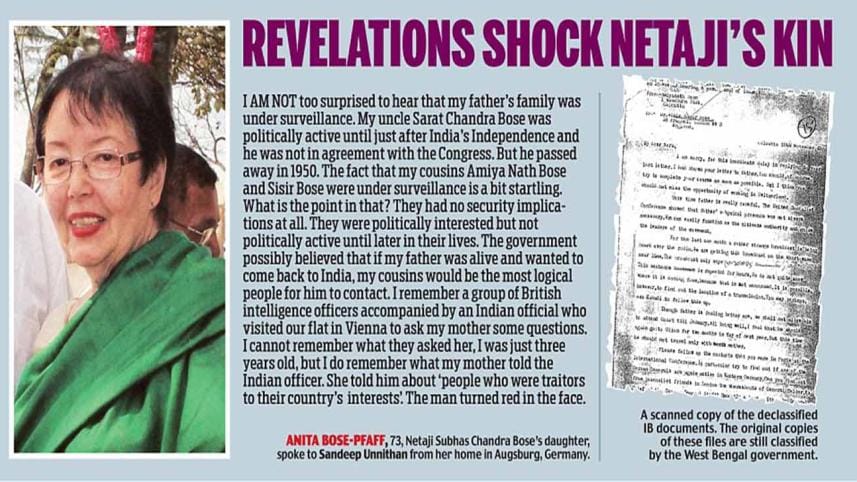Nehru spied on Bose family for 20 years

Two recently-declassified Intelligence Bureau (IB) files have revealed that the Jawaharlal Nehru government spied on the kin of Netaji Subhas Chandra Bose for nearly two decades.
The files, which have since been moved to the National Archives, show unprecedented surveillance on Bose’s family members between 1948 and 1968.
Nehru was the prime minister for 16 of the 20 years and the IB reported directly to him. The files show the IB resumed British-era surveillance on the two Bose family homes in Calcutta: 1 Woodburn Park and 38/2 Elgin Road.
Apart from intercepting and copying letters written by Bose’s family members, agency sleuths shadowed them on their domestic and foreign travels.
The agency seemed especially keen to know who all the Bose kin met and what they discussed.

A series of hand-written messages shows the agents phoned in “Security Control”, as the IB headquarters was called, to report on the family’s movements.
For reasons still not entirely clear, the agency focused on Netaji’s nephew siblings Sisir Kumar Bose and Amiya Nath Bose. These sons of Sarat Chandra Bose were the closest to Netaji in his two decades as a Congress activist. They also wrote several letters to their aunt Emily Schenkl, Netaji’s wife, in Austria.
The revelations have shocked the Bose family.
“Surveillance is conducted on those who have committed a crime or have terror links. Subhas babu and his family fought for India’s freedom; why should be they placed under surveillance?” asks his grand-nephew Chandra Kumar Bose, a Kolkata-based businessman.
Netaji’s only child Anita Bose-Pfaff, a Germany-based economist, says she is startled.

“My uncle (Sarat Chandra) was politically active until the 1950s and disagreed with the Congress leadership. But what surprises me is that my cousins could have been under surveillance… they had no security implications at all,” she says.
“The documents show the intensity of the bias against Netaji and his family,” says former Supreme Court judge Asok Kumar Ganguly, adding: “More shockingly, the bias is by a government of independent India against a man who sacrificed everything for the country.”
“The government was not sure whether Bose was dead, and thought that if he were alive he would be in some form of communication with his family in Calcutta. But why would the Congress be apprehensive? The nation, after all, would have welcomed Bose’s return. But that exactly was the reason for its apprehension. Bose was the only charismatic leader who could have mobilised Opposition unity against Congress, and offered it a serious challenge in the 1957 elections. It is safe to say that if Bose were alive, the coalition that defeated the Congress in 1977 would have trounced it in the 1962 general elections, ie 15 years sooner,” he says.
IB files are rarely declassified. The original copies of these files are still classified by the West Bengal government. Anuj Dhar, the author of ‘India’s Biggest Cover-Up’ who first spotted the files at National Archives in January this year, believes these were accidentally declassified.
“There have been such cases in the US where documents classified by the CIA, like the mole in Mrs Gandhi’s cabinet in 1971, were declassified by the state department,” he adds.
INC president Bose was the Indian National Congress president in 1939 but quit following political differences with Mahatma Gandhi and Nehru. He escaped from India, first to Hitler’s Germany, and later to Japan, where he revived the 40,000-strong Indian National Army in 1943, the first military resistance to the British since the 1857 War of Independence.
Bose, then 48, is thought to have died in a mysterious air crash in Taiwan on August 18, 1945, three days after Japan’s surrender to the Allied forces.
The mystery around his disappearance has only been enhanced by over 150 files kept with the PMO, IB, Home Ministry and External Affairs Ministry, which the government has refused to declassify for decades.
In a written reply on December 17, 2014, Union Minister of State for Home Haribhai Parthibai Chaudhary told the Rajya Sabha that the declassification of ‘Netaji Files’ would impact on India’s relations with friendly foreign countries.
The incensed Bose family now wants speedy declassification of a clutch of top secret ‘Netaji Files’. These sensational documentary revelations, it believes, could well be the tip of the iceberg.
'Government should declassify Netaji files'
What happened to one of India’s greatest patriots - who the British branded a traitor for collaborating with the Japanese and the Germans during World War II - remains a mystery after all these years.
Investigations into his disappearance have contradicted the official version.
What was told to the public was that Bose died in a plane crash in Taihoku airport in Taiwan on August 18, 1945. However, there are some who believe Bose came back to India as a Hindu monk.
And then there are others who say he was kept in solitary confinement in Siberia.
Many believe Jawaharlal Nehru and his government did not want Bose back in India. Lt Colonel Habibur Rahman Khan, Netaji's trusted Aide-de-Camp, is widely believed to be the sole survivor of that fateful plane crash.
Rahman later enshrined Bose’s ashes in the Renkoji temple in Tokyo. He said Netaji died of burns in a hospital later. Rehman himself was badly hurt while trying to rescue Bose from the fire. Skeptics have questioned Rehman’s version too.
I do not understand why the PMO has refused to disclose records relating to Bose’s death as it rejected the argument that there was a larger public interest involved in making them public.
The Right to Information Act allows for a public authority to disclose records which are otherwise exempt from disclosure if public interest outweighs the harm protected.



 For all latest news, follow The Daily Star's Google News channel.
For all latest news, follow The Daily Star's Google News channel.
Comments